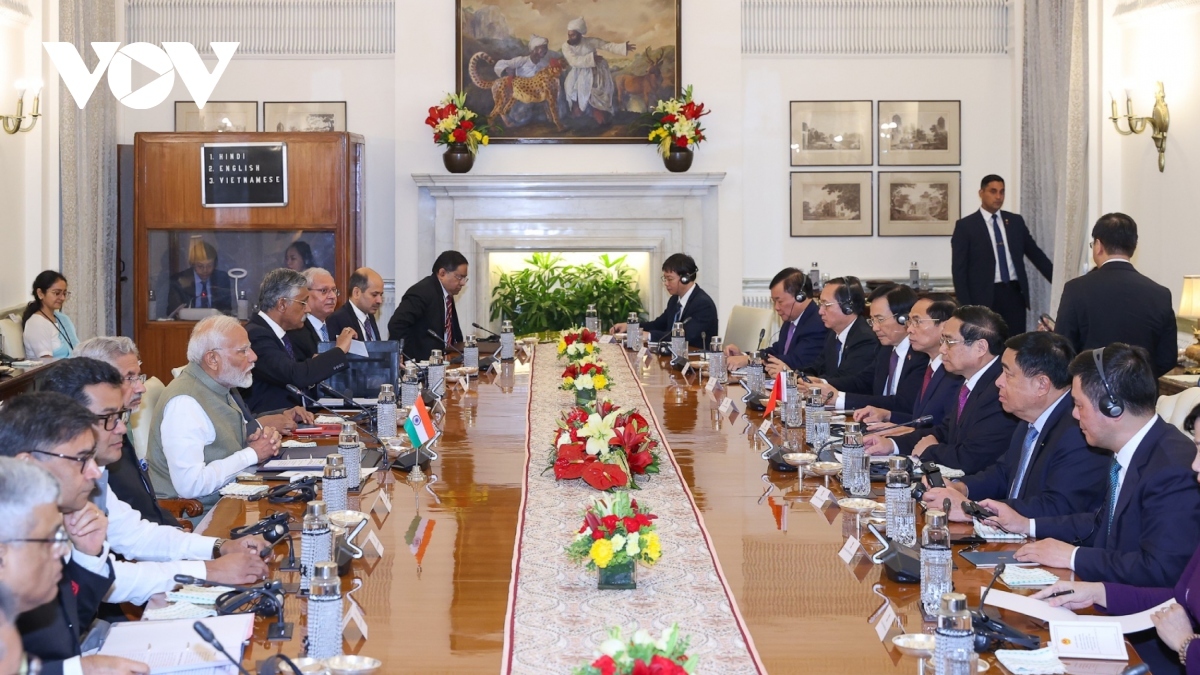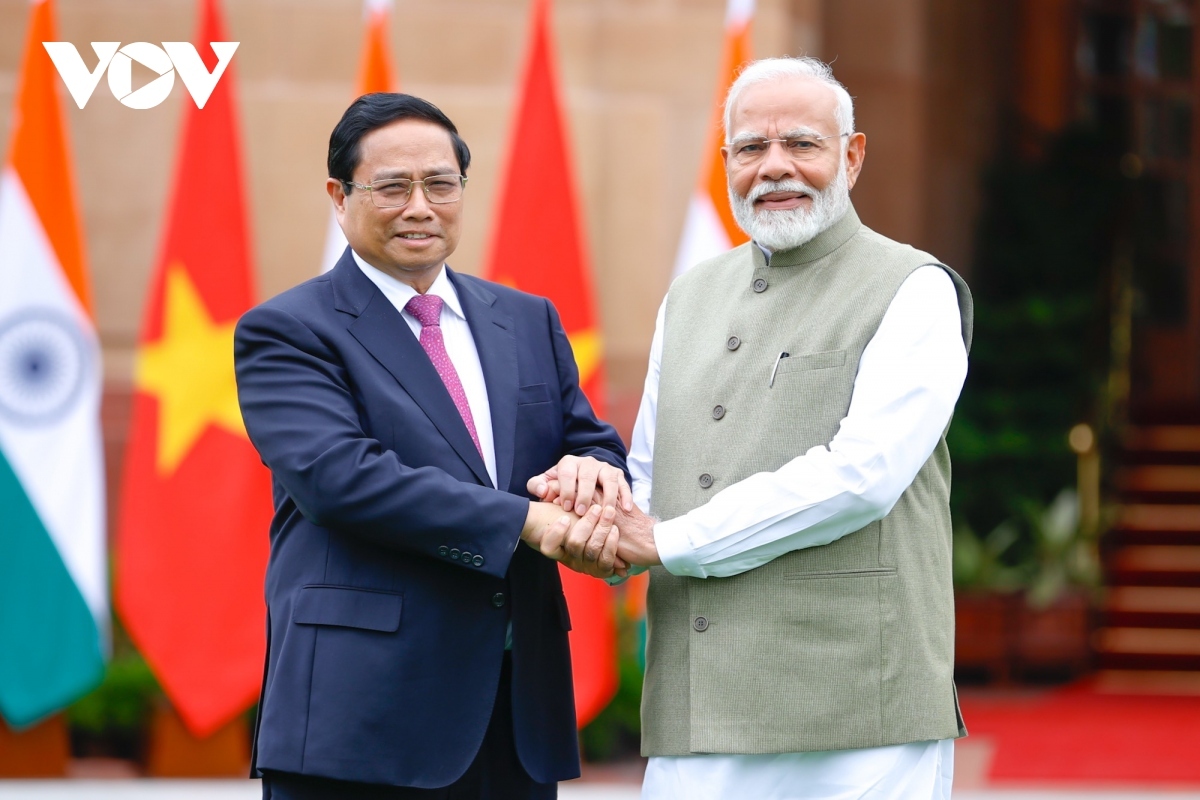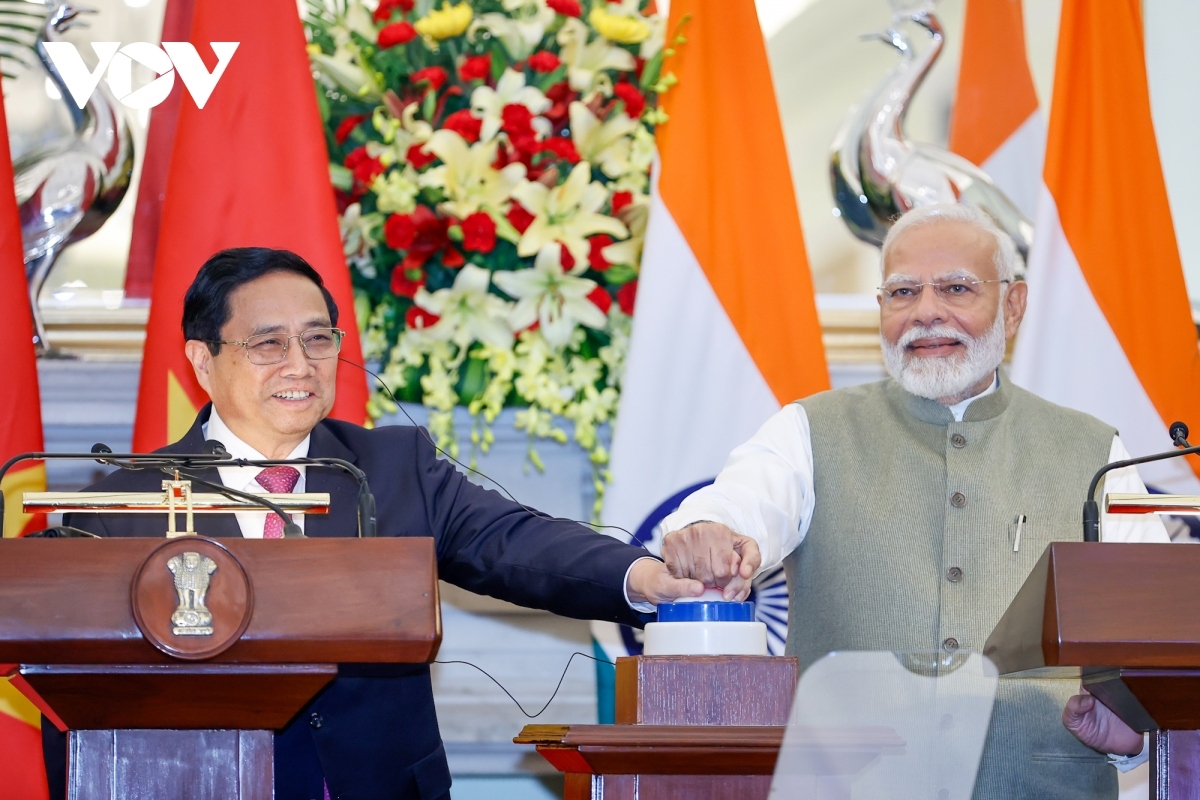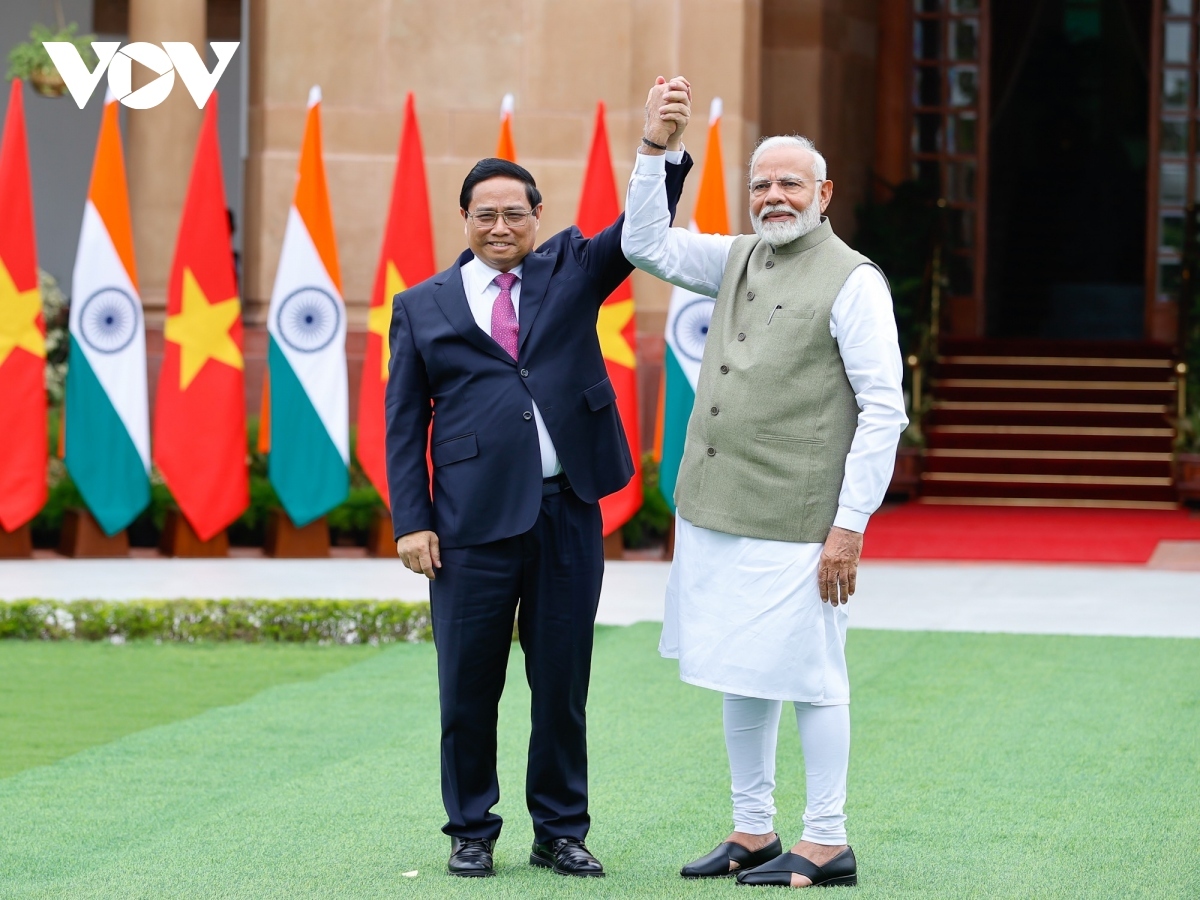India, Vietnam target higher two-way trade turnover by 2030
VOV.VN - Prime Minister Pham Minh Chinh and his Indian counterpart Narendra Modi have agreed to carry out strong measures aimed at meeting the goal of doubling two-way trade and investment turnover from the current level by 2030.

Talks were held between PM Chinh and his Indian counterpart Narendra Modi following the welcome ceremony for the Vietnamese Government leader held on August 1 in New Delhi.
During the course of talks, PM Chinh conveyed warm regards from President To Lam and National Assembly Chairman Tran Thanh Man to PM Modi, as well as the leaders and people of India. They wish to sincerely thank Indian leaders for offering condolences and sending their National Security Advisor to pay respects to Party General Secretary Nguyen Phu Trong, an exemplary and outstanding leader who devoted his life to the country and people of Vietnam.
On behalf of himself and the 1.4 billion people of India, PM Modi expressed his deep condolences for the great loss of the country and people of Vietnam, affirming that General Secretary Trong is a close friend of the people of India. The South Asian nation always appreciates the valuable contributions made by the Vietnamese Party chief to the relationship between the two countries.
The two PMs held in-depth, sincere, and trustworthy discussions on bilateral co-operation contents, as well as regional and international issues of mutual concern. The two leaders emphasized that the joint relationship is rooted in history and has been cultivated by generations of previous leaders and the people of the two nations. The two countries therefore need to continue to cherish and preserve the strong traditional friendship which can be viewed as a valuable asset.
The two PMs were pleased to note that since the establishment of the Comprehensive Strategic Partnership framework back in 2016 during PM Modi's visit to Vietnam, bilateral relations have made remarkable progress, with high political trust, and co-operation in the fields of defence - security, economics - trade and investment, culture - education, and people-to-people exchanges all achieving encouraging results.
Of this, bilateral trade turnover tripled from more than US$5 billion in 2016 to reach US$15 billion in 2023. In 2019, airlines of the two countries opened the first direct flight route between both nations to cause the number of Indian tourists to Vietnam to grow dramatically. This saw a rise from 170,000 in 2019 to 400,000 in 2023, with 56 flights per week between major cities of the two countries.
Regarding the solid foundation of 52 years of bilateral relations and in the face of rapid changes relating to the regional and world situation, the two leaders affirmed their determination to strengthen and deepen the Comprehensive Strategic Partnership over the coming years, meeting the aspirations and legitimate interests of the people of the two countries.
The two PMs applauded the effective implementation of the Joint Statement on Vietnam-India Defence Partnership until 2030, signed in 2022), and agreed to expand cooperation in defence industry and security industry, augment cooperation in maritime security, cyber security, intelligence exchange and counter-terrorism.
India agreed to continue to support Vietnam in training, coaching and capacity building for Vietnam’s defence and security forces. The two government chief concurred to take strong measures towards the goal of doubling the two-way trade and investment turnover from the current level by 2030.

The two sides consented to assign relevant agencies of both sides, through existing mechanisms, to regularly exchange information in a bid to remove trade barriers as well as promote other trade promotion measures.
The Vietnamese cabinet leader encouraged large corporations and technology billionaires from India to invest in Vietnam, creating major projects that are symbolic of economic cooperation between the two countries, welcoming the shift in supply chains and helping the two countries better engage in the global supply chain.
PM Chinh urged India to actively consider proposals from Vietnamese firms regarding the issuance and renewal of the Bureau of Indian Standards (BIS) certificates for goods imported from Vietnam. He also advocated for the early signing of agreements on e-commerce and bilateral trade to fully tap into the growing retail market.
Both sides proposed expanding co-operation in science and technology, especially in the fields of core technology, semiconductor chips, and artificial intelligence. This is along with collaboration in innovation, rare earth mining and processing technology, co-operation in developing the information technology industry and training human resources for the information technology industry in each country, and swiftly moving towards establishing a digital partnership forum and signing a digital partnership agreement.
They also agreed to bolster ties in education - training, culture, tourism, deepening people-to-people exchanges on the basis of promoting similar values in culture, civilization, history, and spirituality, including Buddhism and Yoga.
Concerning regional and international issues, both leaders consented to continue to support each other and boost closer cooperation at regional and international forums, especially the United Nations, ASEAN and ASEAN-led mechanisms, while upholding the principles of ensuring security, safety and freedom of navigation and aviation, and peacefully resolving disputes on the basis of international law, including the 1982 UNCLOS.
After the talks, they witnessed the exchange of nine cooperation documents in the fields of health, law and justice, diplomacy, human resource training, agricultural science, radio and television, tourism, culture, the Action Program to implement the Comprehensive Strategic Partnership for 2024-2028 and the exchange of a diplomatic note on Vietnam's accession to the Coalition for Disaster Resilient Infrastructure (CDRI).
The two sides adopted a Joint Statement on strengthening the Comprehensive Strategic Partnership and the two PMs pressed the button inaugurating the Military Software Park in Nha Trang city.

The two government leaders held a joint press conference announcing the outcomes of their talks on the same day.
PM Modi, on behalf of the people of India, once again conveyed condolences to the people of Vietnam over the passing of General Secretary of the Communist Party of Vietnam Nguyen Phu Trong, and highlighted the late Party leader’s significant contributions to the development of Vietnam-India relations, especially after the two countries upgraded their relationship to a Comprehensive Strategic Partnership.
He said that during his talks with PM Chinh, the two sides had reviewed and discussed in details the bilateral cooperation, and set out orientations to enhance the cooperation across the board, stressing that they reached consensus on elevating the Comprehensive Strategic Partnership to new heights.
The Indian PM informed that during PM Chinh’s state visit, the two sides have agreed on several specific cooperation programmes and projects, such as exchange of military information; maritime cooperation, counter-terrorism, and cybersecurity; review of the ASEAN-India Free Trade Agreement; support for electronic payments; cooperation and mutual support in green economy and emerging fields; connectivity of private, small- and medium-sized enterprises, and startups; agriculture, fisheries; and culture. He added that India looks forward to welcoming more Vietnamese people to visit Buddhist sites and to study or research.
Modi affirmed the Vietnamese government leader’s visit to India opens a new chapter in the relations between the two countries. He said Vietnam strongly supports India's Act East Policy and the increasingly important role of India in key regional and global cooperation institutions, while India supports Vietnam's participation in the Coalition for Disaster Resilient Infrastructure (CDRI) and completing procedures to join the International Solar Alliance (ISA) initiated by India.
For his part, Chinh said that he had held trustworthy, open and practical talks with his Indian counterpart, which resulted in many common perceptions and important results, affirming that the two sides shared a strategic vision on today's world, especially regarding unprecedented changes related to nature and human development.
According to the Vietnamese government chief, the two leaders were glad to acknowledge the significant progress and achievements in the bilateral relationship, particularly since they established a Comprehensive Strategic Partnership in 2016. They reaffirmed the priority and importance they place on each other in their foreign policies, and agreed to continue to preserve and strengthen the traditional relationship between Vietnam and India as sincere, trustworthy, and steadfast friends who have stood by each other throughout history, at present, and in the future.
Chinh said they committed to finding breakthroughs to elevate bilateral relations to a new level and to further strengthening the Comprehensive Strategic Partnership in this new strategic phase.
He said the two sides agreed that there remains huge potential and ample room for both nation to ramp up cooperation, and they should further strengthened the relationship to align with the common trends of the era and to serve the legitimate rights and interests of their people, and achieve each nation's development goals.
In this spirit, the two sides adopted a joint statement on strengthening the Comprehensive Strategic Partnership, and agreed to advance the bilateral cooperation under the motto of Five more, which are greater political and strategic trust; deeper defence and security cooperation; more substantive and effective vision and actions in economic, trade and investment cooperation; stronger scientific and technological cooperation and innovation, and closer cultural, tourism, and people-to-people exchanges.
Chinh said both sides consented to further deepen regional and international cooperation; continue to coordinate and support each other at multilateral forums, especially the United Nations, ASEAN, and ASEAN-led mechanisms; promote peaceful dialogue and build trust among nations; enhance ASEAN's centrality; and promote Mekong sub-region cooperation mechanisms.
He said they reaffirmed the importance of ensuring a peaceful, stable, secure environment, and safe and freedom navigation and aviation in the East Sea, and resolving disputes by peaceful measures based on respect for international law, particularly the 1982 United Nations Convention on the Law of the Sea (UNCLOS). They also consented to exchange information, boost cooperation, and work together to develop the East Sea into a sea of peace, stability, friendship, cooperation and development.




